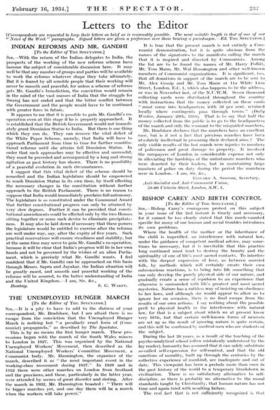THE UNEMPLOYED HUNGER MARCH
[To the Editor of THE SPECTATOR.] Sin,—It is a pity to have to add to the distress of your correspondent, Mr. Bradshaw, but I am afraid there is no escape from the conviction that the Unemployed Hunger March is nothing but "a peculiarly cruel form of (Com- munist) propaganda," as described by The Spectator.
This is by no means the first hunger march. These pro- cessions began with the march of the South Wales millers to London in 1927. This was organized by the National Unemployed Workers' Movement, then described as the National Unemployed Workers' Committee Movement, a Communist body. Mr. Hannington, the organizer of the march, described it as "the most important event in the working-class movement during 1927." In 1929 and in 1932 there were other marches on London from Scotland and the provinces, and these, particularly in the latter year, were attended by scenes of great disorder and rioting. After the march in 1932, Mr. Hannington boasted : •" There will be bigger marches yet, and one -day there will be a march when the workers will take power." It is true that the present march is not entirely a Com- munist demonstration, but it is quite obvious from the names of the signatories to the manifesto calling the march that it is inspired and directed by Communists. Among the list are to be found the names of Mr. Harry Pollitt, Mr. Tom Mann, Mr. Wal Hannington and other well-known members of Communist organizations. It is significant, too, that all donations in support of the march are to be sent to . Mr. Alex Gossip and Mr. Tom Mann at 1 la White Lion Street, London, E.C. 1, which also happens to be the address, or was in November last, of the N.I.T.W.M. Seven thousand collecting cards were distributed throughout the country with instructions that the money collected on these cards "must come into headquarters with 50 per cent. retained locally where contingents pass through towns " (Daily Worker, January 20th, 1934). That is to say that half the money collected from the public is to go to the headquarters of the march and only the remnant to the misguided marchers.
Mr. Bradshaw declares that the marchers have an excellent case, but is it not a fact that previous marches have been absolutely ineffectual in procuring their declared aims ? The only visible results of the last march were injuries to numbers of policemen and great damage to property. It involved the ratepayers of London in considerable expense not only in alleviating the hardships of the unfortunate marchers who were deserted by their leaders, but in maintaining large numbers of police on duty (luring the period the marchers were in London.—! am, Sir, Ste., 58-60 Victoria Street, Landon, S.W.1.








































 Previous page
Previous page